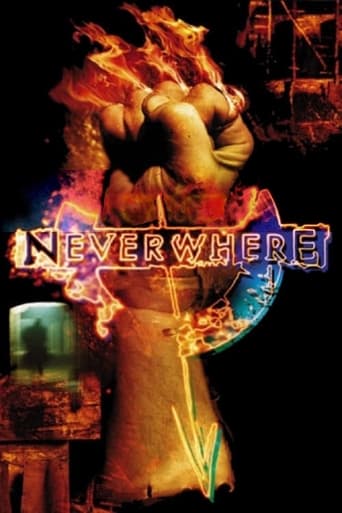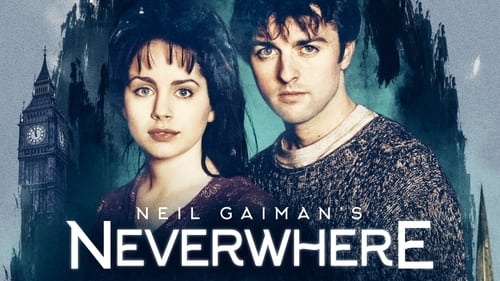Stompgal_87
I first heard of this series through my seminar tutor at university when she recommended I watch it as part of my written assignment about how London has been portrayed on screen due to some of its characters being literal representations of different parts of London (Angel Islington, Old Bailey) and I rented the DVD from LoveFilm. I ended up not including references to this series in my assignment in case I overran the word count but I watched it anyway. After having watched the series, it exceeded my expectations to a lesser degree but I found the story hard to follow in parts.The production values are pretty advanced for 1996, especially the scenes in London Below. While there were mostly dark, eerie and gory moments, there was a touch of humour, particularly when Richard Mayhew introduced himself and said he collected Trolls (which he plays with when he returns to his workplace in London Above in the final episode). Some of the costumes were stunning, especially Old Bailey's feather clothing and the suit worn by the Marquis de Carabas. The best performances came from Richard, Door, Jessica, Hunter, the Marquis, Old Bailey and Angel Islington. The music by Brian Eno was suitably haunting. While the theme music sounds creepy, the closing credits music sounds more pleasant. Further to the production values the camera work is decent, the editing is mostly consistent but fast (particularly in Blackfriars) and repetitive (Richard's nightmare sequence accompanied by the sound of a heartbeat and yet more spooky music) in places while the lighting is atmospheric. The dialogue is dramatic if somewhat idiomatic but it is also witty in parts. In addition to finding the story hard to follow in parts, I also found it repetitive due to two or three episodes all ending with shots of the Angel Islington and I initially found Hunter's gender confusing. Other than that, I enjoyed spotting the interiors of Holborn and Blackfriars stations as well as London landmarks such as St Paul's Cathedral and Tower Bridge.Overall this was a dark yet mostly enjoyable television mini-series that would also appeal to fans of the recent Doctor Who series. 8/10.
Melanie Harcourt
I came to Neverwhere pretty late having enjoyed the Sandman books by Gaiman. He really is a classy story teller and I love the punky, edginess he brings to his tales..The lurid colours in the TV show were a bit odd at times but kind of added to the overall weirdness of a pleasantly unusual story. London I think is an underused city in fantasy and it was nice to see places like the underground and St Paul's being used like this. All the performances were solid enough and thought they came across as accurate depictions of the characters in the book - I heard that Gaiman wrote the novel of his scripts while the TV show was filming so this maybe isn't surprising. A little gem of a TV oddity.
reduxredux
Neverwhere is a good concept hampered by inept handling on all fronts. Though a little gothy (as opposed to Gothic) for my tastes, I was willing to appreciate the story of a second London existing below and alongside the proper one, and the intrigue that happens there. Unfortunately, there are easily fixable slip-ups at every point in the production.One: the acting is ridiculous. Not hopeless, necessarily, but it is melodramatic and theatrical when it should be subdued and forceful. Case in point: the two main villains are silly when they should be chilling. It is especially bad when anyone has to act as though experiencing extreme emotion, as during Richard's ordeal.Two: the writing; specifically, the dialogue. A world like this should enfold as we are immersed in it. The characters should emote through their mannerisms, not their tortured diatribes. Look at Dark City for a similar movie that was handled expertly (save for the terrible ending).Three: the direction. It is compared to soap opera direction on this site. I agree, but I would add that it is unforgivably bland beyond belief. The underground setting alone should be overflowing with great shots (and indeed many of the sets look wonderful; it is the way they are used that wastes them). Look at City of Lost Children for a movie with a similar setting that looks appropriately beautiful and eerie. The fight direction is also amateurish, as when Hunter fights the Black Friar.I think that the best thing to happen to the SF/fantasy genre in recent memory is the explosion of special effects technology. Movies like Jurassic Park, Lord of the Rings, Harry Potter, Narnia, et cetera, have show us that it is possible to fully realize a foreign world. Do I expect a 1996 BBC production with a budget that wouldn't feed the crew of those movies for a day to be able to compete? No, but it does seem like a waste of time to have tried to do it without the resources necessary. Neverwhere is not as disconcertingly podunk as the BBC Chronicles of Narnia (think the letter from the wolf in the first installment), but it is in the running.I'm sure that Gaiman apologists or pale Wiccan wannabes will disagree with my assessments, or my comparison to films with much more talent and money involved. Unfortunately for them, the last twenty years have shown us that anyone with enough drive and vision can make a movie with next to no budget, such as Primer or even Cube, which maintained its otherworldliness with one square room and enough of another room to make it look like there was another cube beyond it. A minimalist fantasy miniseries, i.e. one involving a second London under London utilizing the underground tunnels, could work impeccably, but not when it is weighted down with boring light filters, ugly art design, grating actors, uninspired direction, appalling dialogue, and bad production. A waste of three hours, and innumerable effort on the part of the cast and crew.
Andy (film-critic)
Neil Gaiman is a very professional and entertaining author. His work reaches deep into your imagination ad pulls those chords that you never thought existed until you read his words. He is adventurous, daring, and imaginative with each stroke of his pen. His work forces you to think outside the box and see a new world outside of our own. He is, simply put a genius. Sadly, for those that have never read his work and decide to watch this series will be deeply disappointed. The BBC has crafted a miniseries of one of his stories using cheap production, horrible lighting, and a script that seems so far away from Gaiman that it will bring a tear to the avid reader's eye. When you read one of Gaiman's stories, it is your imagination that makes it a pleasure from beginning to end. He uses amazing descriptions to build the characters and the story into a visionary and symbolic pop-up book. It literally springs from the pages. Your imagination creates the characters and the worlds instead of someone else doing it for you, and that is where this series ultimately fails. This was not how I envisioned Gaiman's story when I first set eyes on it. I saw a much darker world where life hung on a balance and the most unusual characters were born. In this series, I saw clichéd moments coupled with human existence. London Below was full of more than just humans, it was a den of evil and corruption. This was not even explored in this series. Strangely, the themes of humanity were not even uncovered. An aspect that I loved about Gaiman's book was the polar differences between the working class and the poor. The idea that we do not see our fellow man or even remember them is a haunting theme that lingers throughout the book, while in this series it is just a flash in the pan.So, if you haven't read Gaiman's book (which I suggest that everyone should), what can you expect from this series? To begin, the acting is some of the worst I have ever encountered in a series or film. Nobody seemed to be in their role at all. Their characters were so underdeveloped that they changed in nearly every scene. I felt as if the Marquis had just graduated from High School drama and was handed this part. Door was not the woman I wanted her to be, and Richard Mayhew was nothing more than a bumbling idiot with futile attempts of humorous interruptions. These interruptions only soured this series even more. Several times I had to check the expiration date on the DVD box to ensure that this story hadn't curdled. The humor in some of these scenes was unnecessary and a complete knock against the book. I don't remember laughing at all while I read the story, so why should I laugh now. The only aspect that I did laugh at during this series was the acting and the overall cheap feeling I had from watching this. Several showers were taken after each viewing.I would also like to add that director Dewi Humphreys did some of his homework, while the other half was done while deeply intoxicated by an unknown substance. For example, each opening scene was cheap (for lack of a better word) and dizzying. The characters were giving their monologues while splices of freeze-frame were intermixed throughout. I felt like I was watching an Oliver Stone rip-off, and that is being generous. These were supposed to be scenes that introduced each chapter, but instead it left that same sour taste in your mouth similar to the humorous interruptions. They were disgraceful and pointless. What drugs did you need to be taking to find this enjoyable? This also goes the same with Richard's continuous flash-forwards of what was going to happen. These images continuously occurred whenever he walked into a section of the film that couldn't fit into the budget. With the budget being below any corporate standards, Humphreys relied on continual showings of the same image over and over again to drive into the viewer the idea of what will happen near the end. By the fourth time I watched this, I was thankful I didn't have epilepsy and that I hadn't paid good money to see this. The first time I saw these flash-forwards I knew what they were to represent, and anyone that has seen any movies would realize this as well, so you didn't need to reuse it time and time again. This only helped destroy Gaiman's original story.Overall, I was greatly disappointed. There was so much imagination lost with this series that I had to go back and read the story again just to rid my mind of this travesty. For Gaiman fans out there, I do not suggest this series at all. I am saddened by the final outcome and that Gaiman attached his name to such a project. It only proves that a bigger budget is needed to fully convey Gaiman's imaginary voice. I would be happy to have donated some to allow this series to be better. BLAH!Grade: * out of *****




